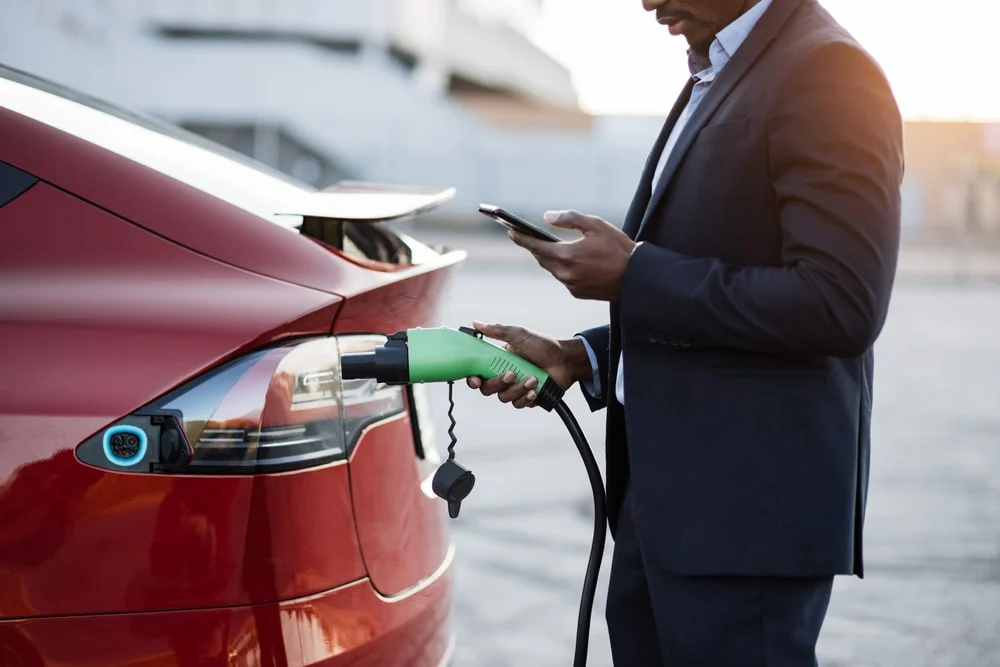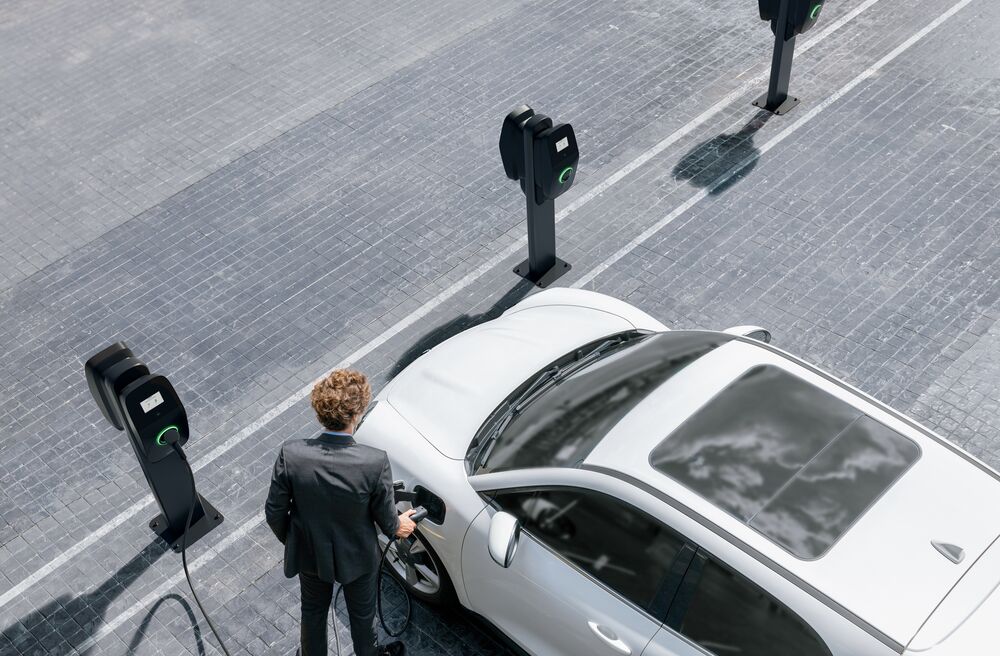On average, AC workplace EV chargers typically cost around €1,300 per charging port (excluding installation expenses). However, several factors influence the exact price of a workplace electric vehicle charger, such as the brand and model, features, and often-overlooked installation costs, which involve specific wiring and cabling for each station.
As a general guideline, installation costs usually account for 60-80% of the total expense, and if you're planning to install a larger network of 5, 10, or 25 charging stations, these costs could quickly escalate to tens of thousands of euros.
Please note: The above information pertains to AC charging stations. There's a significant difference between AC and DC charging stations. For instance, DC (fast) charging stations are in a different league, generally costing around €50,000 per station (excluding installation costs, which usually range from 30-50% of the total station purchase price).
To keep things clear, this article will focus solely on AC charging. However, if you'd like to learn more about DC charging stations, check out our free guides: "Everything Your Business Needs to Know About DC Charging" or "15 Questions to Answer Before Investing in DC Charging."
Employees Are Going Electric

Electric vehicle sales hit a new high in 2022, underscoring the growing trend towards electric mobility. If you've taken a look at your office parking lot recently, you've probably noticed more and more employee vehicles are now EVs.
But the workplace isn't just a place to park—it's increasingly becoming a hub where EV drivers expect to charge their vehicles, including during work hours. In fact, the workplace is already one of the most popular charging locations, with 34% of EV drivers regularly charging at work.
Meeting employee needs is essential, but installing EV chargers comes at a cost. So how do you determine how much your installation will cost, and how can you ensure you're getting the best value? Let's delve deeper into the costs associated with workplace EV chargers.
The Costs of a Workplace EV Charger

In general, there are various cost components, and for clarity, we'll divide them into three categories:
- Upfront costs
- Ongoing costs
- Return on Investment (ROI) and savings
Upfront Costs of Workplace EV Charging Stations
When thinking about EV chargers, upfront costs are often the first thing that comes to mind. These include the actual price of the equipment, along with labor costs for surveying and preparing the site, and purchasing the charger.
Price of Workplace EV Charging Station
Typically, a typical AC workplace charging station costs around €1,300 per charging port (excluding installation costs). The price of a charging station varies significantly and depends on its features and capabilities, such as charging speed and power output, the number and type of sockets, the length of the cable, and any smart charging or connectivity features.
Installation Costs of Workplace EV Charging Stations
Installation costs often constitute the largest portion of an EV charging investment. On average, AC charging station installation costs usually account for between 60-80% of the total costs and can reach tens of thousands of euros if you're looking to install a larger network of 5, 10, or 25 charging stations.
Your location, the complexity of your site, and regional differences in wages can affect purchase and installation costs. Additionally, consider government incentives or rebates that can help offset some of the initial costs.

Ongoing Costs of Workplace EV Charging Stations
While installing a charger may be the bulk of its cost, regular maintenance is necessary to keep it in top condition. Although charging stations are designed to be durable and long-lasting, frequent use can lead to wear and tear on certain parts.
Maintenance Cost of Workplace EV Charging Stations
Essentially, not much maintenance is required, though it's advisable to have an annual check-up to avoid future issues and replace parts like broken cables or damaged sockets.
Rather than sporadic one-off service appointments, it's often beneficial to opt for a maintenance plan or service agreement with a reliable provider. This ensures optimal uptime by addressing and resolving issues early, providing peace of mind and protection from unexpected costs.
Operational Costs of Workplace EV Charging Stations
Beyond maintenance, consider the operational costs of running the chargers, including the electricity used. Using the average electricity price per kWh in the U.S. at $0.15 and €0.25 in Europe, it would cost approximately $8.68 (or €14.88) to fully charge a Nissan Leaf (64 kW) or $14 (or €24) for a Tesla Model S (100 kW).
Assuming you have space for 10 cars, and each one charges for a full 8-hour workday, it would cost you $86.80 (€148.80) to charge 10 Nissan Leafs or $140 ($240) for 10 Tesla Model Ss.
Of course, you don't have to cover the entire cost of the electricity, and there are various business models for offering EV charging at the workplace. This leads us to our next point.

ROI and Cost Savings of Workplace EV Chargers
Installing EV charging at your workplace may initially seem costly, but within a few years, it can actually result in cost savings and even generate revenue, depending on the business model you choose.
Broadly speaking, you can either offer EV charging for free to your employees as a perk or charge users a fee for using the station, offering a discounted rate to employees while charging full price to visitors.
If you opt for the second model, you might discover that after a few years, your EV chargers aren't just breaking even—they're starting to generate a profit. This is particularly true if you open up your charging stations to customers or the general public, effectively positioning your business as a public charging location.
If you operate a fleet of vehicles, installing EV charging stations can unlock further savings by providing transparency and control over charging costs, ensuring you choose the most economical option.

Workplace EV Charger ROI: An Example
Let's see how you might generate revenue from operating EV chargers at your workplace with an example. Suppose you've installed 5 charging stations at a cost of €16,500*, including installation.
Let's assume your chargers are used 5 days a week, with an average charging session consumption of 25 kWh, and are open to both your employees and visitors for a fee.
- Employees benefit from a discounted rate of €0.45 per kWh,
- Visitors pay the market rate of €0.75 per kWh.
Assuming each charger is used once per day, with an average of 3 employee sessions a day and 2 visitor sessions a day, how long will it take to break even on your investment?
Deducting the EU average electricity cost of €0.25 leaves you with a profit of €0.2* per kWh for employees and €0.5* per kWh for visitors. That means you would generate €375* a month profit from employee charging and €625* per month from visitors.
- 5 chargers * 5 days a week * 3 employee sessions a day * 25 kWh * (€0.2 - €0.25) = €375
- 5 chargers * 5 days a week * 2 visitor sessions a day * 25 kWh * (€0.5 - €0.25) = €625
Adding the two profits together, the total profit per month will be €1,000.
With these figures, you would break even in a little over 16 months of operating the charging stations, and anything you earn beyond that point is pure profit for your organization.
Of course, you might find this to be higher or lower depending on the cost of your charging stations and their installation, their usage, the electricity prices in your region, and the prices you charge—if any.
If you'd like to calculate the potential revenue you can make from EV charging in greater detail, download our free EV charging revenue calculator*.
*These numbers are indicative for illustrative purposes only and do not reflect actual costs.

The Importance of Future-Proofing Your Workplace EV Charging Investment
Buying the charging station is a significant expense, but it's worth considering the long-term perspective to future-proof your investment. For instance, you can prepare your location to easily accommodate additional stations in the future without having to redo their wiring, and increase power as the number or speed of charging stations grows.
Consider also that EVs and EV chargers are continually evolving. Here are some current examples of important factors to keep in mind:
EEBus Compatibility
EEBus compatibility enables standardized energy management at the grid connection point and among energy-relevant devices—such as electric cars—inside the building.
Load Balancing
Advanced load balancing features prevent overcapacity by distributing the available capacity over all charging stations. This makes it an important smart charging feature for anyone operating multiple charging ports at a location, especially if there's limited power capacity.
ISO 15118 Compatibility
ISO 15118 is the new international standard that provides a direct communication interface between chargers and EVs, allowing chargers to immediately recognize, identify, and connect to your car and start charging. For example, it can enable automated payments or billing.
OTA (Over-the-Air Updates)
Thanks to enhanced connectivity making charging stations "smart," newer generations of charging stations have the ability to receive over-the-air updates. OTA updates are essentially the ability to download software updates or applications and services, or troubleshoot challenges.

Workplace EV Chargers: An Investment in the Future
Electric mobility is now a reality—it's no longer a question of if, but when your employees will own an electric vehicle.
Installing workplace EV chargers also has an impact beyond your immediate financial bottom line.
By getting ahead of the curve and investing in electric vehicle charging infrastructure now, you can future-proof your organization and provide a high-value benefit that helps boost employee satisfaction, contributes significantly to your organization’s sustainability strategy, and can even be a direct source of profit.
By encouraging employees to switch away from combustion engine vehicles, offering EV charging at work can aid in talent acquisition efforts and make it easier to retain high-skilled employees by providing a highly sought-after benefit.
To learn more about integrating EV charging into your company’s offerings, check out our in-depth guide. If you're ready to start installing EV charging at your workplace, explore our EV charging solutions here.
Workpiece Probe,Tool Setting Instrument,Tool Setter,Renishaw Workpiece Probe
Dongguan Liyang Intelligent Technology Co., Ltd , https://www.leyomachine.com
